— Since 2022, in our country, the "makhallabay" system was introduced for the first time. What is the nature of this position for you, how do you see and understand it?
— This system, introduced at the initiative of our esteemed President, serves, first of all, the interests of ordinary people. Because in this system, problems arising in the regions are solved promptly at the base level — on the spot. The result will ultimately serve the development and future of the Motherland, and the economic and social development of our country will accelerate.
— Tell us more about yourself. How did you come to this position, what did you do before and where did you work? How do you solve new tasks? Are you satisfied with your new job?
— I was born on January 22, 1988. In 2010 I graduated from Gulistan State University, and in 2020 I graduated from the Master's degree program of the Presidential Academy of Public Administration. Prior to the current position, I worked as the head of the department in the Department of Preschool Education of the Syrdarya region. I moved to this position of my own free will and am very pleased with my choice. We have created a "roadmap" for working with each household of the makhalla "Dustlik", and the activities are carried out on the basis of a long-term plan.
— Tell us more about your makhalla. Where is it located, how far is it from the district center?
— To tell you briefly, makhalla "Dustlik" was founded in 1993. The total area is 91.76 sq. km. There are 14 streets, 15 multistorey buildings and 419 private houses. There are 658 households, 786 families, and 2,646 residents residing in the makhalla. The distance from the district center is 0.5 km. The main drivers of the makhalla's development are the service sector and animal husbandry.
— The "mahallabay" system provides for close cooperation of state authorities at all levels. How is this connection established? Do you feel that your activities in the makhalla are supported from the district, the region and the republic?
— Of course, as President Shavkat Mirziyoyev said, the time has come when "not the people serve the state bodies, but the state should serve the people." If possible, we resolve complaints from citizens ourselves on legal grounds and together with various higher-level organizations. Each link of the government, to the extent possible, provides us with direct assistance within its powers. In particular, an electronic platform created to facilitate the activities of deputy khokim helps us to create amenities for citizens.
This platform is very convenient, and most importantly, it allows you to solve appeals without unnecessary efforts and obstacles from the human factor. The convenience for citizens is that we go home with a tablet in our hands, record their appeals on the spot and find solutions through an electronic platform.
The activities of the assistants to the khokims: the results of 2022
On the initiative of the Head of State, from January 1, 2022, in order to ensure the socio-economic development of the makhalla, employment, entrepreneurship development and poverty reduction, the post of assistant to the khokim was introduced in each makhalla. Today, khokim's assistants work in more than 9300 makhallas of the republic.
They studied the socio-economic condition of the makhallas of the country. Thus, 6.9 million households were classified and divided into 4 categories depending on their socio-economic situation. At the same time, the survey examined the wishes of residents to master professions, engage in entrepreneurship, get a loan and others.
It is calculated that 2.5 thousand makhallas specialize in yard cattle breeding, 1.4 thousand — in agriculture, 800 makhallas — in gardening, 620 — in greenhouses, 230 — in handicrafts. It is also calculated that 470 microdistricts specialize in small-scale production, 2.2 thousand makhallas — in trade and services.
Based on the results of the survey, the assistants to the khokims studied the existing problems and opportunities in the makhallas and developed "road maps" for each of them. The state allocated 12.5 trillion sums ($1 billion) of financial resources to solve the identified problems, strengthen social protection, provide employment and support business initiatives.
Due to the use of these funds, the assistants to the khokims employed 1.2 million residents for permanent work, 997 thousand people were able to self-employment, 101 thousand people (together with employees) were registered as individual entrepreneurs, 158 thousand people were involved in paid public works, 418 thousand citizens were allocated land on a rental basis.
Within the framework of the "Family Business" program, loans in the amount of 9 trillion sums were allocated for the implementation of 388 thousand projects recommended by the assistants to the khokims. In order to attract the population to entrepreneurship, provide it with working tools and equipment, subsidies in the amount of 174 billion sums have been allocated. In addition, 243 thousand citizens were sent to vocational training and entrepreneurship training, and 195 thousand people graduated from the “Ishga Marhamat” mono-centers and other non-governmental educational institutions.
Out of more than 48 thousand micro-projects under the "makhallabay" system initiated by the assistants to the khokims, 47 thousand have been launched, about 232 thousand jobs have been created. As a result, 84 thousand legal entities and 95 thousand individual economic entities were registered.
In order to improve the living conditions of the population, 20.6 thousand km of internal roads were repaired, 10.6 thousand km of roads passing through the territory of the makhalla were paved, 1.8 thousand km of sidewalks were built. 6,500 transformers, 178,000 transmission poles and 151,700 lanterns have been replaced. Also, due to the cleaning of 40.7 thousand km of irrigation ditches and the construction of 9.3 thousand vertical and small irrigation wells, more than 332 thousand household plots were provided with water.
In 2023, the assistants to the khokims will also continue to work on solving the socio-economic problems of the population in microdistricts, developing entrepreneurship and reducing poverty within the framework of the makhallabay work system.
— Do you conduct surveys and conversations in the makhalla to identify families in need? How do you identify families in need of support? What criteria do you use to identify the poor and vulnerable?
— In the course of identifying families in need of assistance, visiting each household and conducting an inventory, we divided them into categories. The unemployed, those in need of social support and citizens with disabilities were included in the 1st and 3rd categories. When providing assistance to citizens, first of all, we work with these categories. Based on the results of the inventory, quarterly and annual "road maps" were developed. At the same time, special attention was paid to ensuring employment of the population, in particular, such financial instruments as soft loans, subsidies, as well as attracting citizens who want to study, self-employment, allocation of land and jobs created through new projects.
— Based on your experience, tell me, what are the reasons for the recorded cases of poverty in the makhalla? What else do you think needs to be done to reduce poverty in makhalla?
— There are several factors that lead to poverty. These include the lack of a permanent job, i.e. unemployment, lack of education, as well as a lack of knowledge and skills to establish entrepreneurship. Before starting any work, for example, a citizen who wants to receive a preferential loan or subsidy should have an interest and an appropriate idea of a specific field of activity.
In order to prevent unemployment and poverty, taking into account the growth driver of the makhalla, citizens are provided with appropriate offers and skills. On this basis, large-scale production should be organized in our makhalla. As a result, it is possible to prevent unemployment, create a source of income and reduce poverty. In addition, the establishment of self-employment in each household in such areas as animal husbandry, greenhouse farming and poultry farming will undoubtedly soon give a positive result. In order for people living in poverty not to become more impoverished, we send them to study in mono-centers based on the requirements in the system, so that they have the necessary knowledge before engaging in entrepreneurship.
— What is the level of food security, providing the population with necessary and high-quality food in your makhalla? (Is there systematic monitoring/measurement of the consumption of basic foodstuffs in families in need of social protection?)
— In our makhalla, the necessary measures have been developed for food security, meeting the needs of the population for high-quality food products. For example, with the involvement of leading entrepreneurs, artificial price increases were prevented and food products were sold to citizens at affordable prices. Thanks to this, we have achieved providing the residents of the makhalla with cheap food.
— What kind of work is being done to improve access to education and medical care for low-income and vulnerable families of the makhalla, and to what extent are you trying to solve these problems?
— In this regard, all the work in our makhalla is organized systematically. In particular, up to 50 percent of the contract amount was covered for young people living in low-income and vulnerable families of the makhalla, and funds up to 50 times the size of the basic calculation will be allocated to young people with health problems for treatment in our country and abroad. We also include citizens with health problems in the "Iron Notebook" and "Women's Notebook" and allocate funds to them. On this basis, 12 young people were provided with educational assistance, and 7 citizens were provided with health care.
— What innovative methods have you used in your work to support poor households?
— Supporting these citizens, within the framework of the "Every family is an entrepreneur" program, 89 citizens were provided with employment through the allocation of a loan in the amount of 2,071 million sums for the implementation of 66 projects (18 livestock, 28 service, 5 greenhouses, 10 sewing, 2 confectionery, 1 beekeeping); 33 residents through the allocation of 38 unemployed subsidies to citizens in the amount of 163 million sums; 14 citizens due to the allocation of 50 acres of 7 hectares of cotton-grain land for a period of 10 years. In addition, 123 residents who conducted informal activities in the mahalla were self-employed.
— How much has the attitude towards your work in the mahalla changed, has the trust of the population increased?
— People evaluate our work. At the same time, it should be noted that the trust of citizens has increased significantly. Thanks to the fact that we have given an incentive to low-income citizens, they have a permanent source of income. Our goal is to completely eliminate unemployment and increase the incomes of the population in the mahalla. I am glad that, even at the lowest level, I am making my own, albeit small, contribution to the development of Uzbekistan.
— Today in our country there is a ruthless fight against any forms of corruption. What are you doing to prevent corruption in your activities?
— The ONLINE MAKHALLA platform created for the assistants to the khokims works electronically without the human factor. It is also very convenient for citizens, and most importantly, it does not require any extra effort. In addition, I constantly organize conversations with residents of the makhalla and, on the basis of transparency, provide the public with information and reports on my activities.
Jamoliddin Turdimov, CERR
"Economic Review" Journal №12/2022

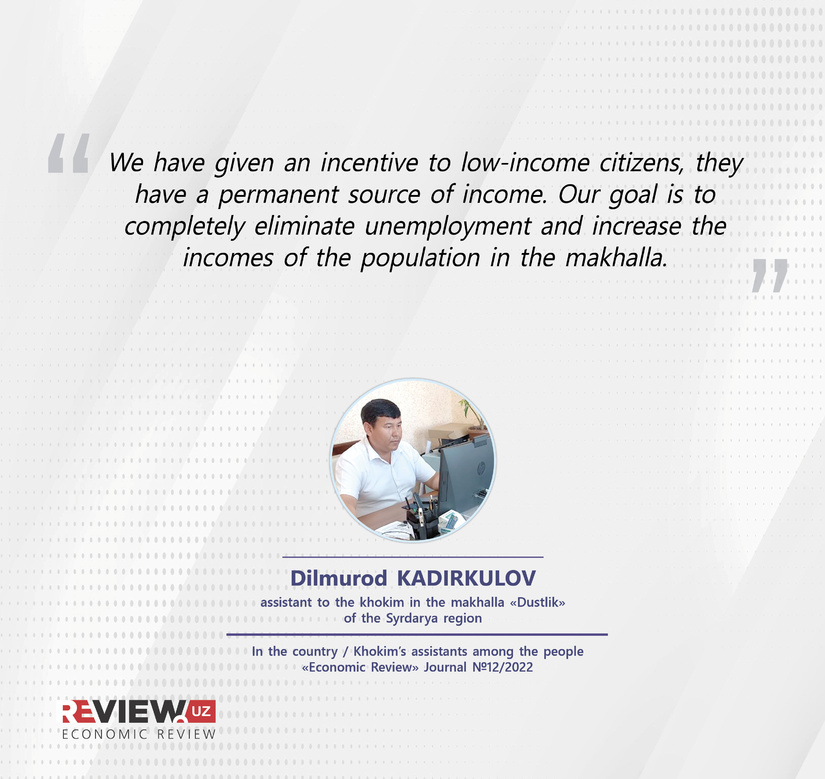
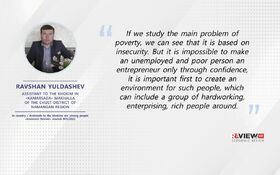
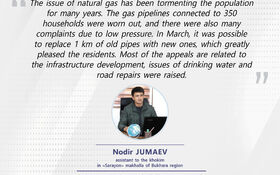
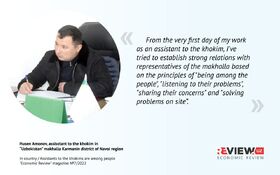




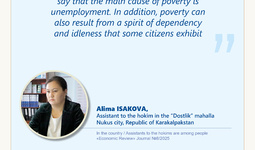
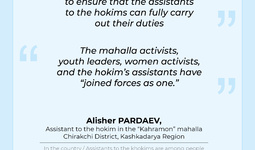








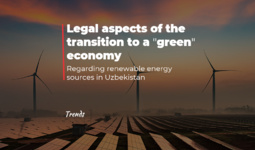




leave a comment